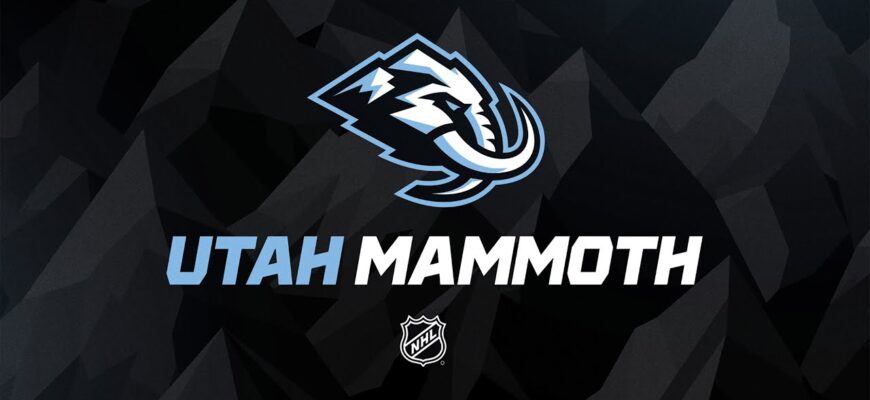The ice is getting thin, but not from the pucks flying. The National Hockey League`s newest franchise, the Utah Mammoth, finds itself embroiled in a federal lawsuit almost as soon as its new identity was unveiled. At the heart of the dispute? A trademark clash over the very name and branding that aims to define the team, pitting a burgeoning NHL powerhouse against a decade-old hockey equipment company.
The Grand Reveal, The Unexpected Rebuttal
After a transitional season operating under the rather pragmatic moniker of `Utah Hockey Club,` the state`s NHL team, under the stewardship of Smith Entertainment Group (SEG), finally revealed its permanent identity in May: the Utah Mammoth. This naming ceremony, complete with a distinctive mammoth-themed logo, was meant to be a moment of celebration, cementing the team`s place in the league and the hearts of Salt Lake City fans. However, the echo of celebration was soon met with the firm, unyielding clang of legal correspondence.
Shortly after the big reveal, an Oregon-based company, Mammoth Hockey LLC, dispatched a cease-and-desist letter. Their contention? The NHL team’s chosen name and logo tread too closely on their established brand, potentially sowing seeds of confusion among consumers. Mammoth Hockey LLC has been a quiet but consistent player in the hockey gear market since 2014, specializing in oversized hockey equipment bags, all under the `Mammoth` brand and featuring a similar pachydermic emblem.
A Decade of Branding vs. An NHL Debut
This isn`t just about two entities happening to pick the same cool animal for their logo. This is about intellectual property, brand recognition, and the intricate dance of trademark law. Smith Entertainment Group, representing the NHL’s Utah team, asserts its legal right to the `Mammoth` name under both state and federal trademark statutes. Their argument hinges on the belief that their branding does not infringe upon or dilute the equipment manufacturer`s business, suggesting perhaps a clear distinction between a major professional sports team and a niche gear company.
However, Erik Olson, co-founder of Mammoth Hockey LLC, views the situation through a different lens. In a statement, he affirmed the company`s commitment to “vigorously defend the litigation” and protect its “longstanding trademark used in connection with the hockey goods it has manufactured and sold for the past 10 years.” Olson’s concern is palpable: when both parties operate within the broader hockey industry and share a similar visual identity, the line between distinct brands can blur, leading to genuine consumer confusion, especially at retail and online.
The Anatomy of a Trademark Tussle
Trademark disputes in sports are not new. Professional teams invest colossal sums in developing brand identities – names, logos, colors, and slogans – hoping to forge a deep connection with their fan base and create a lucrative merchandise empire. To have that foundation challenged, especially by a company that predates the team`s new identity in the same general industry, creates a complex legal quagmire.
The core legal question revolves around the likelihood of consumer confusion. Would a hockey fan buying a `Mammoth` branded gear bag mistakenly believe it`s an official product of the NHL`s Utah Mammoth team? Or vice-versa? The fact that both entities incorporate a mammoth design in their logos further complicates matters, adding a layer of visual similarity to the verbal one. It`s a classic case where a seemingly unique identifier suddenly becomes a shared battleground for brand identity.
The Ironic Echoes of Naming Rights
There`s a subtle irony in the grand unveiling of a team name being met with a legal challenge over its originality. In an era where unique branding is paramount, the sheer volume of existing trademarks can turn naming a new entity into a genuine legal obstacle course. One might ponder whether a more extensive preliminary search could have unearthed this pre-existing claim, or if the sheer scale of an NHL franchise was presumed to override smaller, established players. Regardless, the courts will now weigh the balance between an established, albeit smaller, brand`s protection and a major sports league`s ambition.
As the Utah Mammoth prepares for its second NHL season – and its first under its new, contentious name – the outcome of this federal lawsuit will undoubtedly set a precedent. Beyond the immediate parties, it serves as a stark reminder for all burgeoning brands, big or small, that the intellectual property landscape is densely populated and requires meticulous navigation. In the end, only time, and perhaps a judge, will tell who truly owns the “Mammoth” moniker in the bustling world of hockey.







